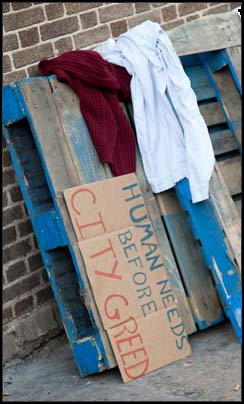
We have often wondered if some kind of guidebook is being passed around, with a title like Harass the Homeless. The subtitle would be, “Kick ‘Em When They’re Down.” There is no shortage of examples.
Barbara Ehrenreich, who has written extensively on poverty-related issues, has founded a project to track some of the kicks. The Economic Hardship Reporting Project supports innovative investigative journalism on poverty and economic hardship.
Business and government alike have discovered that it’s easier and less detectable to take $1 each from 1,000 poor people than it is to take $1,000 from a solvent person.
The only sector of the economic conspiracy against the poor that has had some light shed into its dark corners is the loan industry, which includes both major big-name companies and strip-mall payday loan outfits. Currently, they can get away with charging interest that sometimes adds up to 600% per year. In regard to this and numerous other disgraceful practices, Ehrenreich says:
Before we can ‘do something’ for the poor, there are some things we need to stop doing to them.
For examples of what ought to stop or be stopped, see “How scammers keep targeting Michigan’s homeless” by Ted Roelofs, who gives just a few instances in just one American city.
A day laborer puts in a full shift cleaning and renovating an apartment, for an employer who disappears without paying. A man helps paint a house and ends up with only one-fourth of the pay that was promised. Con artists convince homeless people to cash forged checks, or use their personal information to fraudulently get funds meant for students. A meth cook recruits the homeless to go into drugstores and buy ingredients for his illegal enterprise.
Citing Kim Bobo, who wrote Wage Theft in America, the author estimated that through devious practices, employers manage to extract at least $100 billion each year from employees who are helpless to do anything about this, even if they somehow find out about it. Keep that number in mind, it comes up in the next paragraph, as Ehrenreich stacks up some economic facts:
The government distributes about $55 billion a year, for example, through the largest single cash-transfer program for the poor, the Earned Income Tax Credit; at the same time, employers are siphoning off twice that amount, if not more, through wage theft.
Temporary Assistance to Needy Families, for example, our sole remaining nationwide welfare program, gets only $26 billion a year in state and federal funds. The impression is left of a public sector that’s gone totally schizoid: on the one hand, offering safety-net programs for the poor; on the other, enabling large-scale private sector theft from the very people it is supposedly trying to help.
Many jurisdictions charge defendants for their court costs, and for room and board in the jail. We know a woman whose children were removed from her custody for questionable reasons, and put into foster care. That turned out badly for the kids — one went to juvenile incarceration and the other to some kind of state rehab program. And now the state is sending bills to the biological mother for both.
Ehrenreich mentions a similar mess:
The poster case for government persecution of the down-and-out would have to be Edwina Nowlin, a homeless Michigan woman who was jailed in 2009 for failing to pay $104 a month to cover the room-and-board charges for her 16-year-old son’s incarceration. When she received a back paycheck, she thought it would allow her to pay for her son’s jail stay. Instead, it was confiscated and applied to the cost of her own incarceration.
A homeless person lucky enough to have a vehicle and unlucky enough to be stopped for a traffic infraction could find fines piling on pretty quick, like $214 for failing to notify the DMV of an address change within 10 days. Or $436 for not having the right kind of child seat, or $796 for failing to provide evidence of insurance. Next thing you know, this person doesn’t even have a car.
Governments at every level have discovered the awesome power of fines, and the only thing that can be said for that is, morally it’s a step above stopping citizens at random and taking their cash. But Ehrenreich points out the absurdity: “80%-90% of criminal offenses are committed by people who are officially indigent.” This certainly includes people experiencing homelessness. The law creates homelessness every day.
Reactions?
Source: “The poor: America’s piggy bank,” Salon.com, 05/17/12
Source: “How scammers keep targeting Michigan’s homeless,” MLive.com, 10/12/11
Image by jramspott (John Ramspott), used under its Creative Commons license.


